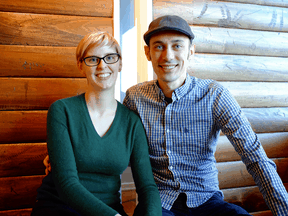Breadcrumb Trail Links Local Business Books Opinion Columnists E-commerce success Shopify began with Tobi Lütke trying to sell snowboards off the internet from his laptop in an Ottawa coffee shop. Larry MacDonald’s new book explains the pivotal role Lütke’s girlfriend, later his wife, played. Published Dec 16, 2024 • Last updated 3 hours ago • 8 […]

E-commerce success Shopify began with Tobi Lütke trying to sell snowboards off the internet from his laptop in an Ottawa coffee shop. Larry MacDonald’s new book explains the pivotal role Lütke’s girlfriend, later his wife, played.

Article content
Shopify, now the second-largest e-commerce platform in North America, started with Tobias (Tobi) Lütke trying to sell snowboards off the internet from his laptop in an Ottawa coffee shop. This excerpt from Larry MacDonald’s new book, The Shopify Story, explains the pivotal role Lütke’s girlfriend, later his wife, would play.
Article content
Article content
***
Chapter 2 — Prelude to the Launch
Advertisement 2
Story continues below
Article content
ENTER FIONA MCKEAN
The daughter of Canadian diplomats, Fiona McKean had grown up in Ottawa and several countries around the world. She met Tobi Lütke in the online fantasy game Asheron’s Call, playing from Ottawa while he played from Germany. Separated by six time zones, Lütke stayed up late at night to play. They chatted and went on quests together, their avatars fighting virtual monsters on journeys within the multiplayer game. In the real world of continents separated by the Atlantic Ocean, the vibes between the two were good.
Lütke flew to Canada for a winter holiday and to meet McKean at the Whistler ski resort in British Columbia. She was about the same height and age as Lütke, wore horn-rimmed glasses and had her blonde hair cut short. Personality-wise, McKean was “50% Geek, 50% Nerd,” as she described in her bio on X. Lütke was smitten.
Alas, vacation time was over and he had to fly back to Germany; McKean had to study for her undergraduate courses in history and English literature at the University of Ottawa. After departing, they maintained a long-distance relationship online. But parting was such sweet sorrow that when McKean completed her bachelor’s degree, she went to Germany to work and be with Lütke for nearly a year.
Advertisement 3
Story continues below
Article content
In 2002, she returned to Ottawa to study for a master’s degree at the Norman Paterson School of International Affairs, a top training ground for people seeking careers in the foreign affairs department of the Canadian government. Lütke followed her to Ottawa, intending to support himself as a remote worker for a German company. “It was cool that I was still being paid by a German company even after I moved to Canada,” he told the Mixergy podcast.
When McKean was working on her master’s degree, Lütke’s assignment with the German company dried up. Not that he minded. The software tools were uninspiring and the coding was “the driest of the dry kind of stuff.” In fact, he was feeling burned out. Yet, he wanted to stay with McKean. He could not get a job in Canada because he didn’t have a work visa, but there was no law against starting a business. He was mulling over becoming an entrepreneur, and perhaps it was taking too long because McKean told him: “Look, I’m super busy because I’m finishing this degree. You should find something that makes you super busy. We don’t have kids; we don’t have a lot of costs. Now’s the time to jump. So I’ll jump with you.”
Advertisement 4
Story continues below
Article content
Lütke thus became an entrepreneur. The McKeans’ dinner table was where it began. There, he met Scott Lake, a friend of the family. Lake was 12 years older, athletic and a venture capitalist who made friends easily. They shared a common interest: snowboarding. This led to trips to the ski hills and a plan to sell snowboards online. Lütke had just bought a snowboard for himself after doing some in-depth research, so he felt he could leverage his product knowledge to sell snowboards on a website. Lake could take care of the business side of the store, to be called Snowdevil (a snow devil is a vortex of swirling snow created by wind gusts). The company was incorporated on Sept. 28, 2004.

“At the beginning, there was no grand plan,” Lake said. “We just said let’s do e-commerce, let’s sell some snowboards.” Lütke was going to set up the Snowdevil website using “off-the-shelf ” software packages such as Miva, OsCommerce and Yahoo! Stores. He did not want to code a website from scratch because he was still burned out from programming and did not want it as a job, only as a hobby. He would be happy if he could just become a retailer and turn his passion for snowboarding into a source of income.
Advertisement 5
Story continues below
Article content
***
THE SNOWDEVIL INITIATIVE
During his early years as an entrepreneur, Lütke did not collect a salary. He lived with McKean in her parents’ home. The couple stayed for quite a long time. “It was 2014 before we moved out,” Lütke told the How I Built This podcast. He was very grateful for the support provided by McKean’s parents: “I can’t believe the amount of patience and trust they had in me, but somehow they let me do my thing.” McKean’s parents were indeed special people; they too played a pivotal role in the Shopify story.
Entrepreneurship was not something foreign to Lütke. His grandmother Erika ran a printing business in Koblenz; as a kid, Lütke would visit her to help out and watch the Letterpress churn out printed pages. He also ran some of his own enterprises as a youth. To raise money to buy more computer equipment, he bought items in bulk at wholesale prices and resold them to schoolmates in smaller batches at retail prices. Quite popular were the Magic Eye books, whose images turn into 3D pictures when looked at with unfocused eyes. Also, during his apprenticeship, he and some friends started a company to create a software program that processed and managed customer issues at call centres (which didn’t work out).
Advertisement 6
Story continues below
Article content
To get Snowdevil up and running, Lütke lugged his laptop to the Bridgehead coffee shop on Elgin Street. He commuted by skating down the Rideau Canal in the winter and biking or longboarding the rest of the year. The coffee shop had Wi-Fi that he accessed for free and fixed when it went down. Seated amidst the patrons sipping their lattes and cappuccinos, he tapped away on his laptop and explored several software packages for online stores, including Yahoo! Stores. They didn’t fit the needs of a first-time entrepreneur very well. They seemed to be meant for established businesses and were over-featured for his requirements. Moreover, the packages weren’t that easy to install or customize. He nonetheless cobbled a website together.
To promote the Snowdevil website, Lütke and Lake used Google AdWords. This involved bidding for search terms related to snowboards, such as the name of ski resorts. When people googled terms like “Whistler ski resort,” an ad for Snowdevil could appear near the top of the search listings. Back in 2004 and 2005, not many people were bidding for Google AdWords, so Snowdevil loaded up on the ads and got some good results.
Advertisement 7
Story continues below
Article content
In its first year, Snowdevil sold about 40 snowboards and turned a modest profit. The first sale, to someone in Pennsylvania, came soon after the store opened. It was a magical moment, the kind Lütke will never forget. He remembers what he was wearing and where he was at the time — he was just beginning his workday in Bridgehead on a day in November of 2014 when there was a “ding” sound from his laptop and an email came in with the header: “New Order!” The impact was profound: it wasn’t just a new order but his first ever.
“I realized, in that moment, that I had gone from someone who did something kind of interesting to actually being an entrepreneur,” he explained. How immensely satisfying it was to see what his digital construct had done — it caused a commercial transaction to occur between two distant, anonymous parties and brought some money into his register. That “ding” sound turned out to be a clarion call to his life’s work.
But plugging gaps in the Snowdevil website and rendering improvements was still an uphill battle. “The final straw was when I got a custom design made for my snowboard store and I couldn’t get it to work; Yahoo! Stores barely allowed me to change the background colour of the top frame,” Lütke told Signal v. Noise.
Advertisement 8
Story continues below
Article content
As a wave of disgust was sweeping over him, he got a message from his friend Daniel Weinand in Germany about an open-source coding language called Ruby on Rails. It was devised by Danish programmer David Heinemeier Hansson, who at the time had a gig at the software development firm 37Signals. Ruby on Rails was so new that there was not even a 1.0 version; the only version available was passed around as an attachment to an email. Lütke downloaded it and fell in love.
Ruby on Rails had a syntax that looked more like English, which decreased the “cognitive load” and time required to complete jobs. It assisted with debugging programs by flagging typos and offering suggestions to fix them. It also simplified the creation of web applications with default structures for coding, databases and web pages. One could perhaps say the framework was like a box of Lego with pre-fitted blocks of code that could be connected together to build a web application without having to do everything piece by piece. Lütke liked it so much that he realized he was not burned out because of programming per se; the problem was with the constricting languages that he had to use in the companies he once worked for.
Advertisement 9
Story continues below
Article content
With his newfound enthusiasm, Lütke spent mostly rapturous hours learning Ruby on Rails, contributing to the open-source community and crafting the kind of online store he wanted for Snowdevil. A few months later, after a lot of pizza and late-night coding, Lütke jubilantly posted to the Rails community:
“At long last, it’s done. Snowdevil launched on 31.1.2005 after close to 4 months of the most intense but also fulfilling programming of my life … This is the time where small businesses can compete or outperform big businesses just because of better tools … I can’t even put into words how thrilled I am that the first milestone is done, and the groundwork is laid out … We have very ambitious plans for the Snowdevil codebase and great technical challenges are yet to come. I can’t wait!”
Meanwhile, McKean was doing well for herself, too. She obtained her master’s degree in international studies and became a deputy director in Global Affairs Canada, the foreign affairs branch of the federal government. McKean then left the government in 2015 and became the operator/co-owner of The Opinicon after performing extensive renovations to the 120-year-old lodge south of Ottawa.
This edited excerpt is from The Shopify Story: How a Startup Rocketed to E-commerce Giant by Empowering Millions of Entrepreneurs by Ottawa author, economist and journalist Larry MacDonald. Copyright, Larry MacDonald, 2024. Published by ECW Press Ltd. www.ecwpress.com

Recommended from Editorial
-
 Newsmaker of the decade — Shopify: ‘This is kind of blowing my mind’
Newsmaker of the decade — Shopify: ‘This is kind of blowing my mind’ -
 Shopify Surges On Strong Sales Growth Outlook
Shopify Surges On Strong Sales Growth Outlook
Article content









 Newsmaker of the decade — Shopify: ‘This is kind of blowing my mind’
Newsmaker of the decade — Shopify: ‘This is kind of blowing my mind’  Shopify Surges On Strong Sales Growth Outlook
Shopify Surges On Strong Sales Growth Outlook 





Comments